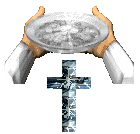
Services
Feria Parish Mass Thursday 2nd September at the earlier time of 9.30am
Parish Mass Sunday 5th September at 9.30am
Coffee Mornings
We are pleased to announce that these will resume from Tuesday 7th September from 10.00am and every Tuesday thereafter. We look forward to meeting old and new friends alike.
St Mark’s gospel today shows us a scene where the Pharisees are observing the disciples of Jesus and criticising them for eating with unclean hands. We might think that they had a point. After all, if we are paying attention lately, we shall still be very aware of the risk that germs carry. We are still quite rightly being asked to sanitise our hands for our own safety and for that of other people.
To put this gospel passage into context it has more to do with ritual purity. The practice of washing the arms as far as the elbow and of people sprinkling themselves when returning from the market perhaps had its origins in a healthy desire for hygiene. Still, we get the sense here that the Pharisees are more bothered about traditions. They seemed very aware of their own propriety and saw people less observant than themselves as people to be shunned. In their desire to stick to rules, those rules became an end in themselves. The love that was at the heart of God’s law was being squeezed out in favour of human traditions.
Jesus has no qualms about shining a spotlight on this hypocrisy. We see in the gospel that Jesus was willing to mix with sinners and to eat with them. The Pharisees and others were scandalised. Did Jesus not know what these people were like? Well, he did, but he still saw them as human beings and had compassion on them. Jesus was not taken in by outward appearances, because he knew what was on people’s hearts. He knew that people who were labelled sinners could be capable of kindness and compassion. He also knew that the righteous and the ritually clean could be capable of envy, pride and hardness of heart.
Above all, Jesus taught that it was not outward things that would contaminate our spiritual lives. What makes the difference in the end is what comes from our hearts. It is easy to blame other people for what goes wrong or to look past our own faults, so as to highlight the faults of others. Jesus names the dishonesty that is at work here. He compels us to look at our own hearts first.
We don’t have to look too hard at the world to see the effects of human sinfulness. The terrible scenes from Afghanistan in recent days show the human capacity for evil very clearly. No doubt the perpetrators of these dreadful events believe themselves to be in the right. In comparison with this our own faults may seem very small. But Jesus shows us that sin should never be taken lightly. Every human being has a capacity for goodness but also for doing harm. The closer we get to the goodness of God, the more we shall become aware of our own need for repentance and forgiveness. If we are honest, then we shall stop blaming outside causes, especially other people, and instead see our own need for God.
When Jesus calls the Pharisees hypocrites it may sound as though he himself is being judgmental. Really it is more of a wake-up call. Hiding behind rules and traditions will not make us holy. It is only when we take the word of God into our hearts that our lives begin to change. No matter how divided our hearts may be and whatever darkness may lurk there, God is calling us back to himself. God alone can cleanse our hearts. We see in Jesus the compassion of the God who does not wish to condemn us or other people. Instead we discover healing and new life.
When we are honest with ourselves and when we accept God’s forgiveness, then we experience a love that is all embracing. Through this we cannot help but look at other people and desire for them the same gift. So let us pray today that our hearts may be cleansed by God’s life-giving grace and our lives transformed so that we may be channels of that same healing love.
 RSS Feed
RSS Feed